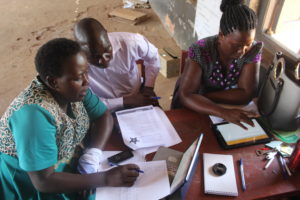© Helvetas
Launched in 2018, funded by the European Union and Belgium and implemented by Enabel, the Wehubit program supports digitalization as a lever to accelerate sustainable development by providing financial support to digital development projects in Belgian cooperation partner countries. “These 5 new projects allow us to contribute to the response of the European Union to the COVID crisis in education. Through their digital innovations, the actors have transformed the risk of reducing access and quality to education into an opportunity to review certain habits and ways of doing things. At Wehubit, they complement a portfolio that already covers topics as diverse as women and youth empowerment, climate-smart agriculture, eHealth, inclusive and sustainable urbanization, and digital skills,” explains Arnaud Leclercq, in charge of the Wehubit program.
DIGITAL TRANSITION AND PEDAGOGICAL INNOVATION IN HIGHER EDUCATION IN NIGER
In Niger, the health and security situation has reduced access to higher education. The Agence Universitaire de la Francophonie (AUF), in collaboration with the Ministry of Higher Education and Research of Niger, aims to strengthen the resilience of the higher education system. Specifically, the project will deploy a digital distance learning platform for all departments of the Abdou Moumouni University, the largest in the country. In addition to the technological aspect, the project will also address the pedagogical and regulatory aspects of blended learning. This will facilitate the expansion of this digital space to other academic institutions in Niger. The pedagogical method is modern: learning by doing. The devices of this platform will go in this direction, alternating for example sequential and group activities.

© Agence Universitaire de la Francophonie
DIGITAL ASSESSMENTS AND SCHOOL IMPROVEMENT PLANS TO ENHANCE EDUCATION RESILIENCE IN UGANDA
In Uganda, only three out of ten children who start primary school reach the last grade. Why? Among other things, the difficulty of implementing education policies and the lack of resources and interest given to voices advocating for the sector. Edukans wants to use the EDU Q-card online tool that allows schools to (self-)evaluate their performance through 40 quality indicators. Teachers, management, parents and communities are all involved. Action plans are generated taking into account the functions and individual priorities of each to improve the quality of education. The Ministry of Education and Sport also benefits from access to the platform to ensure the alignment of these action plans with national and local education policies.

© Edukans
LET’S GO DIGITAL! PROVIDING VOCATIONAL EDUCATION THROUGH A MOBILE PLATFORM – VETA VSOMO – IN TANZANIA
Vocational training is the hope for many young Tanzanians to earn an income and improve their living conditions. But this was without taking into account the difficulties related to distance and high costs, obstacles that are even greater for the more disadvantaged rural populations. The free digital vocational training application VSOMO, developed by the state-run Vocational Education and Training Authority and the telephone operator Airtel, is a response to this challenge. Helvetas aims to make the application more attractive and effective in reaching more users by developing gamification elements for various vocational courses. These digital enhancements will be accompanied by media campaigns in the Dodoma and Singida regions to encourage youth to use the application for the theoretical part before joining a VETA training center for the practical part.
The University of Rwanda has installed a multimedia studio on its Rukara Campus. Several members of the academic staff are trained in the design of digital knowledge products for students. The University of Rwanda plans to equip 6 more campuses with such multimedia studios in order to maximize access. These studios will allow to make online educational resources more interactive and to better involve students, especially the most vulnerable ones. The university aims to train 90 teachers and 600 students in EdTech methods. From then on, teachers will have the adequate capacities to create quality digital content.
ASK THE TEACHER
Uganda is one of the countries where schools have been closed for the longest time due to the health crisis. Distance learning has therefore become a norm. Teacher training in this new mode of teaching is not widely available, as teachers have limited time and financial resources. Save the Children is taking advantage of an innovative and intuitive tool to meet this need: an interactive voice server that provides access to pre-recorded lessons, complemented by SMS text messages. The project will develop a series of complementary professional development modules for teachers and quizzes that will be hosted on the existing server. The districts of Kasese, Bundibugyo and Ntoroko are targeted in the first phase. The second phase envisages expanding access to the service through the establishment of a nationwide free line.
